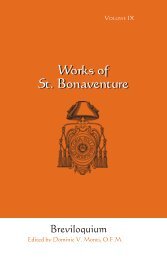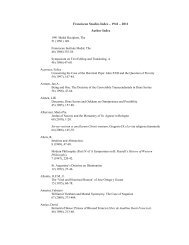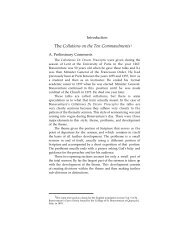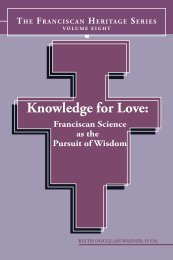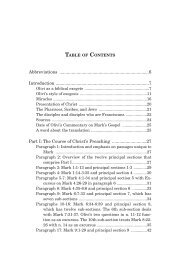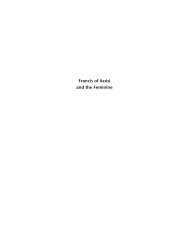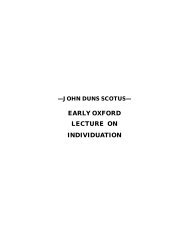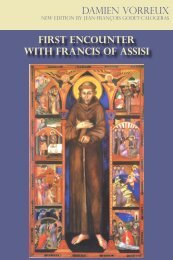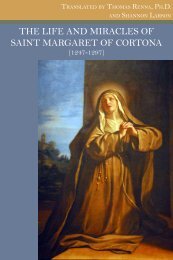FOUR QUESTIONS ON MARY - Franciscan Institute Publications
FOUR QUESTIONS ON MARY - Franciscan Institute Publications
FOUR QUESTIONS ON MARY - Franciscan Institute Publications
You also want an ePaper? Increase the reach of your titles
YUMPU automatically turns print PDFs into web optimized ePapers that Google loves.
John Duns Scotus: Four Questions on Mary<br />
would eventually outnumber the old, and Feast of December<br />
8 would become simply that of the Immaculate Conception<br />
and the Marian prerogative it honored would some four centuries<br />
later be defined as a dogma of faith.<br />
The third question on marriage illustrates the difficulty<br />
theologians in Scotus’s day had in reconciling the Marian account<br />
in the Gospel of Luke with that in the Gospel of Matthew.<br />
The first contained the story of the Annunciation, the<br />
second that of Mary’s marriage to Joseph. When Gabriel announced<br />
she was to become the mother of the long awaited<br />
Messiah, Mary expressed surprise. “How can this be since I<br />
know not man?” The traditional explanation of the Fathers<br />
of the Church was not just that she was still a virgin, but<br />
that she had no intentions of ever having sexual relations<br />
with a man, and had even taken a vow to that effect. And<br />
it was to one vowed to virginity that Gabriel addressed his<br />
answer: “The Holy Spirit shall come upon you, etc.” For medieval<br />
canonists concerned with the legal aspects of contracts<br />
made under oath, this presented a problem. If Mary had<br />
vowed perpetual virginity, how could she take marriage vows<br />
as well? Did not the partners exchange the sexual rights to<br />
each other’s body for the purpose of procreation as well as<br />
for mutual support and comfort? Some theologians suggested<br />
the vow of virginity was taken only conditionally and not<br />
absolutely. Scotus was quick to perceive the condition they<br />
suggested did nothing to solve the legal problem. He offered<br />
instead another canonical solution based on something Pope<br />
Nicholas III had granted to the <strong>Franciscan</strong> Order of which<br />
he was a member. The vow of poverty taken by <strong>Franciscan</strong>s<br />
differed from that of other Orders in that it was not only<br />
et hanc sententiam tenent omnes antiqui theologi: Alexander, Thomas in<br />
suo IV et II, Bonaventure, Richardus, licet novi quidam theologi a sensu<br />
communi ecclesiae recedentes teneant contra, indevoti revera Dominae, et<br />
tamen devoti cupientes apparere nitantur, eam quodammodo sic Deo et suo<br />
Filio comparantes, quorum opinio nova et phantastica sit a fidelibus cancellata,<br />
quia sanctificationem Virginis negat contra id quod tenet Ecclesia<br />
ipsam sanctificationem fuisse. From the long list of these new theologians,<br />
however, it is clear that he was one of the minority of <strong>Franciscan</strong>s who<br />
held out against the Immaculate Conception; on the other hand, as Brady<br />
shows (see the preceding note), opponents without the Order, especially<br />
among the Dominicans, grew in number.<br />
20



